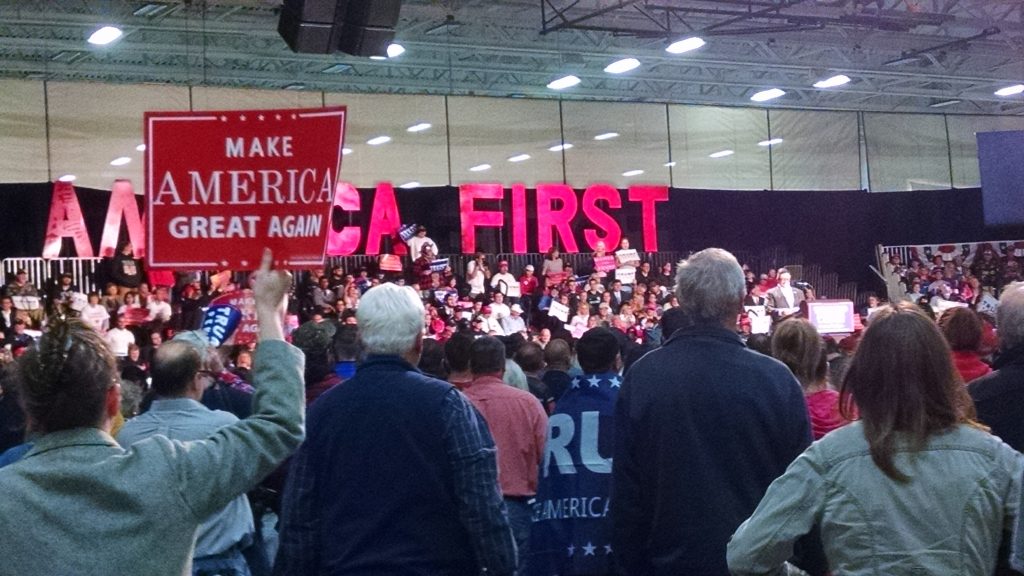What Does ‘Working Class’ Mean?
Donald Trump courted “working class” voters in Macomb County. Some of those voters say that “class” is vanishing.

Many analysts are attributing Donald Trump’s victory in the presidential race to his courting so-called “working class” voters.
Donald Trump pitched his ability to bring jobs back to Michigan repeatedly during rallies in blue-collar Macomb County, an area where voters heavily supported the Republican candidate after going for Democrat Barack Obama in both 2008 and 2012.
But just what does the term “working class” mean to voters?
In a completely unscientific survey WDET’s Quinn Klinefelter talked with several people in Macomb County about their definition of the “working class.”
That includes Brian Leonard, a furniture retail employee from Roseville.
“I think of a hard-working American citizen,” he said. “Pays their taxes, does their job, 9 to 5. Because I work for the rich, I deliver to rich people, you feel really blue-collar when someone labels you like that, ‘working class.’ They’re putting us in the minority. “
And Leonard says that segment of the population is dwindling.
“Yeah, probably for the past couple decades actually,” Leonard said. “Think about it. I mean I’m young but (I’m sad.) It’s been the working class that has really moved America, you know what I mean?”
Lou Sochko says he understands. Originally from Mount Clemens, Sochko says he’s been a painter for 25 years.
“The working class to me means middle-class American workers. You know, the average guy that doesn’t make a ton but hammers away and hammers away hoping for the American Dream,” he said.
“I heard something the other day that the wage for Middle America hasn’t gone up in 8 or 10 years. So that says a lot to me. I feel it. I didn’t need to hear that stat but I firmly believe it.”
But Sochko says there can still be an economic rebound for the working class.
“Somebody’s got to find a way to stimulate the economy a little bit. Here we had lost so much manufacturing, I think if we could get some of that back… But I think that is one of the things that, once it’s gone, it’s not coming back.”
President-elect Donald Trump repeatedly pledged during the recent campaign to bring jobs back to the industrial Midwest.
And Sochko thinks he has a chance to make good on his vow.
He said, “I think if anybody can, it’s Trump. I think he will make an effort to bring some of the companies back. But the Big 3 is so big around here, you know. All these job shops up and down 9, 10 Mile, Schoenherr, Groesbeck (streets.) When I was a kid they were thriving. And now these American parts are made in other countries. And I just don’t see that coming back.”
Sochko says his hopes rest, at least in part, on Trump.
“I just think that if there’s anyone out there that might be able to turn things around it’s him. There’s too many people that just don’t give a damn anymore. And that’s no good for anybody.”
Roseville retail worker Josh DeBusschere says the state of the working class is in flux. Big league.
“I think it’s kind of choppy right now. I mean a lot of people aren’t working, a lot of people are working and not making much. A lot of people should be working that aren’t working.”
DeBusschere says he heard both presidential candidates promise that they would help “working class voters.”
“I hope that they were referring to all the manufacturing jobs that were well-paying jobs that aren’t around anymore. You look at Chrysler, Ford, GM. They used to have tons of jobs around here. Now all those jobs are gone. Look at Flint. (That city) has kind of died since they left there. That’s what kind of built Flint and now look at what that’s done there.”
He hopes Trump can make a difference.
“I think it’s possible. It’s going to take work. It’s going to take a lot of work. I would hope it’s possible. Most of those jobs are overseas or across the border or done by computers. There’s only so much you can actually bring back. But any bit counts. I know a lot of people who even still work for the Big 3 and they’re constantly either getting laid-off or shut down for periods of time and going back.
DeBusschere added, “Guy working on the assembly line. There ain’t much of that anymore. That was a well-paying job. Lot of people made a good living off of that. Now those jobs are few and far between. If you can get into it that’s great. But there has to be a plant that’s functioning.”
